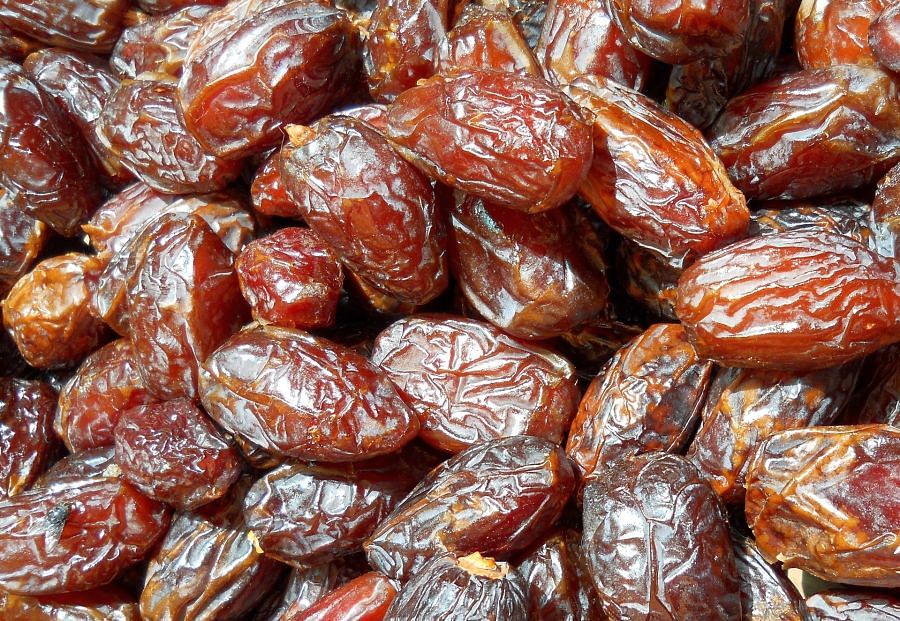
Dates (khajoor or kharjura in Kannada), might look like humble fruits, but they are packed with nutrition and have a lot of health benefits. Additionally, they are high in fibre which is good in clearing the intestinal tract. So, they clearly qualify to be called a superfood.
Dates are extensively used in sweets in India. For someone with a sweet tooth, date and jaggery-based preparations are not too calorie-rich because jaggery can be used instead of refined sugar.
Date syrup can also be used as a substitute for honey as a sweetener.
DH lists a few health benefits of dates:
Nutrient-rich:
Dates have a bit of calories but they contain a lot of fibre and a small amount of protein. Additionally, they have minerals like potassium, magnesium, copper, manganese, iron and vitamin B6.
Good for the skin:
Dates have vitamin C and D, which help in keeping the elasticity of the skin. They are also known to have anti-aging properties by keeping a check on melanin build-up in the body. The skin is thus benefitted.
Ample fibre:
Dates have ample fibre and this will do a lot of good for clearing up the intestinal tract and help in bowel movement. Additionally, fibre can be good for blood sugar control because it slows down digestion.
High in antioxidants:
Antioxidants can help in reducing harmful reactions in the body, which could end up getting diseases. It does this by protecting the body cells from free radicals. Dates mainly have antioxidants flavonoids (can reduce inflammation and reduce risk of diabetes and Alzheimer’s disease), carotenoids (helps in promoting heart health) and phenolic acid (can reduce inflammation and help in lowering chance of heart disease).
Blood pressure regulation:
The potassium in dates helps in lowering blood pressure. Inadequate potassium in the body may also lead to kidney stones.
Iron-rich:
Dates are rich in iron. This is helpful since iron deficiency could lead to anemia.
Good for bone health:
Dates contain phosphorous, potassium, calcium, copper, manganese and magnesium. These minerals could help in preventing osteoporosis.
Improvement in brain health:
Dates are known to protect against inflammation of the brain. The fruit is also known to protect the brain against oxidative stress.
Recipes:
Kharjura holige/ puran poli/ obbattu:
This is a traditional south Indian sweet preparation, mostly made during festivals.
A cup or so of rava, a couple of tablespoons of maida and a bit of salt are mixed into a dough. For the filling, deseeded dates must be soaked in warm water and then ground into a paste. In a heated pan, add two teaspoons of jaggery and let it melt. The date paste is added next and followed by desiccated coconut and a bit of cardamom and sauteed.
Take a small portion of dough and flatten it a bit. Then take a bit of the date filling and after placing it on the dough, cover it like one would do to make a paratha. Roll it flat and cook on a heated tava until both sides turn a bit brown.
This recipe does not have to use too much jaggery because dates are sweet on their own. A minimal amount of oil has to be smeared when it is being cooked on the tava.
Date kheer/ payasa:
The ingredients required are a cup or so of chopped dates, two cups of milk/ coconut milk, a bit of cardamom powder, half a tablespoon of cashewnuts and almonds, both chopped.
The dates have to be ground to a paste in a food processor with a bit of milk. The cardamom powder and remaining milk/ coconut milk should then be mixed with this. Boil this mixture for a short while and the payasa is ready. This should be sweet enough, but a bit of jaggery can be added if one wants it slightly sweeter.
The dry fruits can be sauteed a bit in ghee and added to the payasa. However, this step can be left out if not desired.
There are several variants in the way this payasa is prepared and it sometimes differs from region to region.